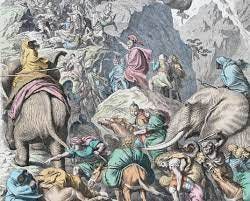If you are looking for the beginning of the study for The Young Carthaginian then you can go HERE for a brief introduction. At the bottom of the introduction you will find the links to each section of the study guide as it becomes available. If you would like to see the growing list of book studies available for free on this site you can go HERE. Enjoy!
Grammar Questions: (The Information of the Text)
How did Nessus free Malchus’ chains from the Roman guards to whom he was attached?
How did Malchus and Nessus manage to get out of the Roman camp unnoticed?
What did Malchus and Nessus use to break the chains off of Malchus’ legs?
How did Malchus and Nessus acquire food when they were desperately hungry?
What time of year was it when Hannibal led his troops to cross the Alps?
How were the Carthaginians able to take advantage of the night time to get ahead of their enemy?
According to the text, why were the elephants helpful in deterring the enemy?
What did the engineers do in order to help the soldiers finish the journey?
How many of Hannibal’s men were lost in the expedition across the alps?
Logic Questions: (Interpreting, Comparing/Contrasting, Reasoning)
In what way might we say this escape from the Roman camp is similar to Malchus and Nessus’ earlier escape from the tribesmen in chapter 10? Make some comparisons and contrasts between the two incidents.
In reply to Malchus’ thanks for saving his life, Nessus responds by saying “My life is my Lord’s…Glad am I indeed that I have been able to do you a service.” Why is Nessus so devoted to Malchus?
What are some things might we infer about Nessus from his question about the shepherd boy, “Shall I shoot him?”
What are the various factors which made it so difficult for the Carthaginians to cross the mountain pass?
Rhetoric Questions: (The Analysis of Ideas in the Text)
As Malchus and Nessus are trying to make their way back to the Carthaginian troops they steal a sheep because they are very hungry. Given the circumstances do you think that this was right or wrong to do? If you think it was permissible, why? If you think it was wrong, what might you have done instead?
In light of the heavy cost of crossing the Alps with his troop, do you think Hannibal was prudent in making his attack on Rome in this way? Why or why not?
Theological Analysis: (Sola Scriptura)
Exodus 20:15 tells us, “You shall not steal.” Read also what Jesus says in Matthew 12:1-8 about what David did which was unlawful. Do you think Malchus and Nessus’ situation in this chapter is similar to David’s? You can read 1 Samuel 21:1-9 for even more context. How do we work through such difficulties biblically?



